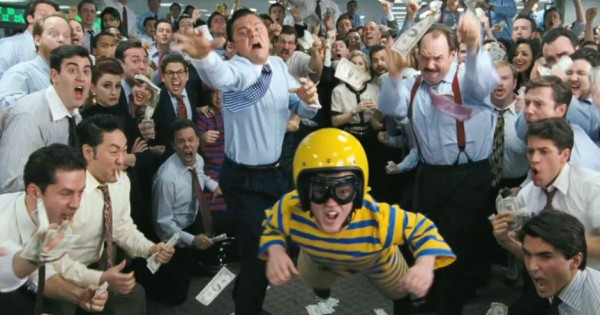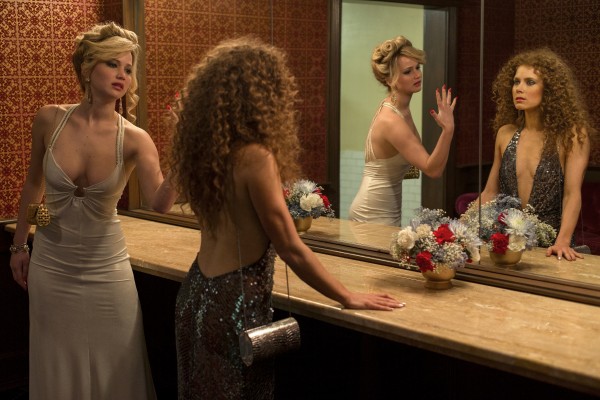Culture
Oscar 2014 Roundup
By: Scott Pfeiffer
Posted on:
To think about movies in terms of the Oscars is to distort our thinking, and not only about the movies themselves. Still, as much as the Academy Awards is an excuse for celebrities to slap each other on the back, it also must be seen as a time to celebrate the artists who are great at what they do, in all the arts that make up that art we love, cinema.
It's as much a part of the pageantry and history, the dream and illusion of the movies as Hollywood itself. Every great director has coveted a little golden statue (and many of the very best, from Chaplin to Welles to Hitchcock to Lynch, never won one).
That said, here's my take on some on some of the Best Picture contenders. (What about Captain Phillips and Philomena, you ask? I simply haven't had a chance to see them yet.)
The Wolf of Wall Street

Louis Rukeyser never hinted at this sort of thing. Could this be Scorsese's Fire Walk With Me, a Dionysian unleashing of the id that may be his purest self-expression even as it threatens to careen off the rails? (And this at a time when David O. Russell was threatening to out-Scorsese Scorsese with American Hustle.) This is exhilarating, ultimately empty cinema: the cinemamatic equivalent of a hit of the cocaine that everyone here hoovers up so greedily.
It’s another depraved, juicy role for Leonardo DiCaprio, who sinks his teeth into it, giving a performance of remarkable physical comedy. He plays a real-life character, an amoral trader who rose from penny-stocks to become a king of shady financial instruments.
I suppose for people not already accustomed to viewing Wall Street as a more-or-less criminal milieu, every bit as "gangster" as the worlds of Casino and Goodfellas, this film might shock. It didn't show me anything about the money milieu I didn't already suspect. Fascinating, subersive, as empty as the people it's about, The Wolf of Wall Street may go down as Scorsese’s last word on the subject of money.
Her

"I think, therefore I am," was one of Descartes' good ones. His zinger resounds down the centuries all the way to this movie, a sweet, lyrical "Spike Jonze love story." (The subtitle mentions the auteur, I suppose so we don't think we're going to get Richard Curtis.) It's a colorful canvas.
In the near future a sweet, geeky man, Theodore Twombly (Joaquin Phoenix) falls in love with his phone, "Samantha" (voiced by Scarlett Johansson). Samantha is a creative entity: she draws, she composes music, she changes based on her "life" experiences. It's a story told largely in close-ups; Phoenix' expressive face carries the movie. Theodore's best buddy, Amy, is played by Amy Adams, as sexless here as she was sexed up in American Hustle. "Falling in love is a crazy thing to do," she says. "It’s kind of like a socially acceptable insanity."
Jonze has said that his film is not really about technology. It's about the pain of change, of growing apart. How sad it is to lose someone through growing up. The movie is wise about Theodore's complex feelings for his ex-wife Catherine (Rooney Mara). She is the person from whom he grew away. What he comes to understand is, that’s just another way of saying she was the person he grew up with.
Nebraska

In Alexander Payne’s latest film, his fourth set in Nebraska, silos line the skyline of cinematographer Phedon Papmichael's black and white landscapes, sad and beautiful. Payne puts people on screen we don’t usually see in the movies. They huddle in flannel. They may never have seen color. (Their only sin, to paraphrase Dylan, is their lifelessness.) Life has been such for these men that there’s really nothing much to say.
Bruce Dern plays Will Forte’s elderly dad, Woody. He’s non-verbal, a dazed, shambolic alcoholic. A wispy halo of white hair springs from his hard pate, a pate as hard as the land itself. This is a showcase role for Bruce Dern, who must use his eyes, the set of his mouth, a stumbling gait to suggest a lifetime of pain tamped down, with only the quick pleasure of a sexual grapple to redeem it. There's a raw defiance there, too. Then there's June Squibb, playing Woody's hilariously tart wife, who’s been riding him mercilessly for the entire film, visits him in the hospital and tenderly smoothes down that flyaway hair as he lies unconscious.
What does Payne think of these people? I think he regards them in much the same way as Will Forte's character does. He grew up around them, but as much as he'd like to understand men like his father, he knows they will always remain a mystery. He doesn't laugh at them either, exactly (although they can be very funny). He has come to a place in his life where he accepts them as they are.
Gravity

This year’s purely cinematic experience, a story that could only be expressed fully in the medium of cinema: not as a novel, not on the small screen nor stage.
Alfonso Cuaron’s elemental tale of survival put us in a spacesuit with America’s sweetheart, Sandra Bullock (in a fine performance), and cast us adrift in the cosmos. We felt everything she felt, as she first accepted that she would die, and then chose to fight to live.
The thrilling images were vast, vertiginous; the sounds could be as intimate as a heartbeat.
12 Years a Slave

Here is another tale of survival. Solomon Northup (Chiwitel Ejiofor), a free, educated black man, a violinist, was kidnapped and sold into slavery in 1841.
He ended up deep in Georgia on the plantation run by a dissipated, sadistic man called Epps (Michael Fassbender), his fate to be some kind of crucible for Epps’ feverish shouldering of the "White Man’s Burden."
In order for a period movie to work, the very atmosphere has to be right, from costumes and set design all the way down to supporting performances and the language, here written by John Ridley, adapting Northup’s 1855 memoir.
Here everything is right, so that raw white supremacy feels as natural and American as breathing. The director, Steve McQueen, and his cinematographer, Sean Bobbitt, create images rich in texture.
Alfre Woodard has only one scene, but it’s chilling. Fanning herself on the porch, her smile never fades as she utters a chilling line: The curse of the pharaohs got nothin’ on what’s going to happen to these slavers.
And after a time we’ve seen so much brutality that we’re calling out for "Django"–for an avenger, for a cathartic bloodbath.
But this film shows the reality. The heroism was just to survive, and that left you feeling like no hero at all. Chiwetel Ejiofor’s expressive performance translates Northup’s inner life into visual terms.
American Hustle

You just want to say it's cracking entertainment and leave it at that, as though that were a small thing. It's based on a real-life political scandal, and it's evocatively rooted in a specific time and place: the 1970s in New York/New Jersey, with outrageous costumes, funny hair, great music, energy and delicious performances.
The movie is not as empty as its critics would have it. It's sincere. And it's not without thematic resonance (everybody does the American hustle, after all). Still, some of the material has a warmed-over feeling, as if Russell still doesn't quite have a style of his own.
What stays with you are moments: Bradley Cooper, high on himself (among other things), overcompensating for being a sheltered mama's boy, sitting on a couch giddily mocking the recently departed Louis C.K., as his hapless boss. Jennifer Lawrence is very funny as the wild card: When she sidles up to the bar next to the gangsters in her slinky gown, she's brassy, gutsy, insecure, awkward, reckless, naive, so many things all at once.
Christian Bale is the potbellied, oddly decent con-man who can't help caring about his loved ones. The most moving moment is when Bale's character confides that the greatest regret of his life is losing the friendship of his friend, the mayor of New Jersey (Jeremy Renner), whom he more or less reluctantly conned. He really means it.
Dallas Buyers Club

We'd had hints of how good Matthew McConaughey was becoming (and what a surprise!), but we didn't know he had this in him. He’s perfectly cast, playing a real person, Ron Woodroof, a homophobic cowboy in the near past (1985), who is blindsided when he learns he has contracted AIDS from too much partyin' and lovin'.
This was in the wake of Rock Hudson's death, a time I remember well, when awareness of AIDS was just breaking in the wider culture, when it could still be the subject of nervous death's-head jokes amongst us adolescent boys. When Big Pharma and the FDA ban the meds Ron needs to stay alive, he smuggles them in, opening a "club" where, for a fee, members get the drugs.
Jared Leto is unforgettable as Rayon, a transvestite who would have fit right in as a Warhol "superstar," yet couldn't be more out of place in mid-80s Dallas. He's a survivor, though. No one could be less likely to accept Rayon than Ron, yet he comes to love him with a tough love. This is never discussed but is instead shown, in that great supermarket scene where Ron twists his redneck buddy's arm, forcing him to shake the despised Rayon's hand.
The director, Jean-Marc Valée, proves here how very good he is with actors, guiding both McConaughey and Leto to Academy Award nominations. And it's not just the physical transformations, as a stunt, we should note here. It's the uncanny way that McConaughey inhabits not just Ron but the '80s as a time, even down to the way he wears his glasses, somehow. It's a raw, furious, wary performance, and he never hits a false note.
As for Leto, he does not make Rayon a "tragic" figure. The tragedy is in the raw fact, which Leto makes you feel in your gut, that the very essence of who Rayon is, is a survivor: he does not want to die. And that is tragedy enough.
You could say we needed this movie years earlier, but maybe that just goes to show how far we have already come from a time when people had to be ashamed to be themselves, had to die scared and more or less alone. After the distortions of awards season have come and gone, this picture will continue to haunt its viewers. In the unforgiving fact of these alarming bodies, we see the true story of AIDS inscribed. Of the contenders I've seen, this is the best picture.

